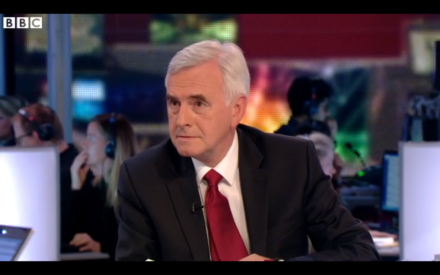
John McDonnell said he is furious that a “disunity dossier” was released by the Corbyn campaign. In fact it was probably a good thing that it was published, because their embarrassment may lower their sensitive guard long enough for us to talk about what’s been going wrong.
I once wrote an article about railways on Jon Lansman’s blog, after I discovered that my local railway was run by the Belgian state. Rail nationalisation hadn’t been an issue for 20 years, because it was argued that it would cost too much, but I suggested that we don’t have to buy them out, we could just choose not to renew at the end of the contract. I didn’t think it was an important post but, a few months later, the unions got behind the idea and it has been central to Labour’s identity ever since.
The point of this irrelevant boast is that if Corbyn’s leadership cannot win me over, then they must be doing something very wrong.
The early days of Corbyn’s leadership were not easy. He had at least ten Labour MPs openly hostile to him, briefing the press and keenly ensuring that the journalists spelt their names correctly. He could have appealed to the moderates and sidelined the agitators, but instead he seems to have done exactly the opposite. By the end of his first year, he had 172 MPs openly hostile to him. Yet he says this is not his fault.
In the leadership election that followed, Jeremy showed quite some chutzpah by blaming Labour’s division on the MPs, rather than accepting responsibility as leader. Owen Smith disastrously failed to make this point.
The single admirable strategy of Owen Smith’s campaign was his determination not to make personal attacks against Jeremy. His efforts were rewarded with American-style attack ads making wholly inaccurate allegations about his professional integrity. So much for Corbyn being a breath of fresh air against the cynical politics of Westminster.
John McDonnell on Question Time was there to persuade the audience to vote for Labour, but instead described a democratic vote as a coup. I can understand that kind of bitterness from someone who had lost a vote, but they appear to be winning. What must the audience think when people with a history of supporting authoritarian regimes confuse the ballot box with a violent uprising?
In the 1970s there was a TV show about a street communist called Citizen Smith. The character carried around with him a little black book, in which he would list the names of people who had offended him, so that after the revolution he could have them lined up against the wall and shot. It’s comical to imagine fiction becoming reality, but the real issue is why there is no dossier of MPs who have done a good job?
When Jeremy became leader he appointed a shadow cabinet, then promptly ignored them. After spending 30 years voting against Labour on his conscience, he then tried to marshal them into voting for pacifism over the bombing of Isis, a military policy that was later proved successful. He must now realise that considerable responsibilities of leadership and team-building come with the honour of the office.
We are now about to discover whether Jeremy continues to be leader. Those who wish to continue opposing him must realise that they will be blamed for disunity, so have reason to keep their hostility to themselves. Shadow cabinet elections will also give MPs a stake. People like Alastair Campbell will match the tone, if they see that it is important to others. But the leadership themselves need to realise that they must win their colleagues over, while sidelining any troublemakers, and that this task will take determination and patience.
Judging by John McDonnell’s appearance on Question Time it seems unlikely that they will achieve this and it will be a disaster at the next election. After all, few people in that audience agreed with his view that the buck stops at the bottom.




More from LabourList
‘The High Court judgment brings more uncertainty for the trans community’
‘There are good and bad businesses. Labour needs to be able to explain the difference’
‘This ruling should now remove any remaining barrier to approval of EHRC code’